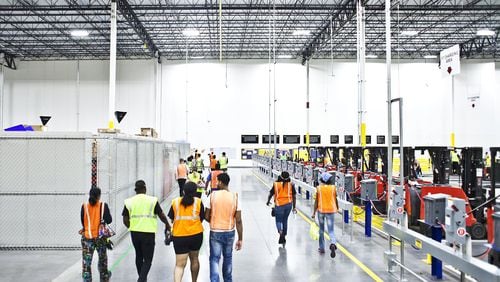Factory workers for Georgia-based Mohawk Industries can go to health clinics the company runs onsite. The Kaiser Permanente HMO healthcare model started when the shipbuilding company branched out to offer healthcare to its employees.
When news broke Tuesday that Amazon, J.P. Morgan and Berkshire Hathaway were joining forces to lower their healthcare costs, it was a bombshell for the health industry. But it wasn’t new.
“We’ve had business groups on health that have pushed the envelope in terms of improving quality and efficiency for a long time,” said Patricia Ketsche, a fellow in the Georgia Health Policy Center who researches health care financing and delivery. “What these companies are really signaling – what Amazon is signaling – is they don’t believe the insurance companies are either able to or are maximizing their influence over the delivery of health care. They are essentially signaling the market that they think they can do better.”
Ketsche and other Georgia healthcare analysts said there is no way to know yet just how the initiative will end up impacting Georgia companies or patients. But right now there seems to be little check on skyrocketing out-of-pocket costs for patients.
The stock market indicated right away that there’s an opening for someone to do health care pricing better than existing healthcare companies. Stock prices for insurance companies slid markedly, by 4 percent to 5 percent.
“I think the most interesting part so far is how the stock market punished healthcare companies,” said Chris Kane, a health insurance consultant in metro Atlanta. “I would theorize it’s the equivalent of three rock stars forming a new band.”
Georgia companies contacted by The Atlanta Journal-Constitution on Tuesday mostly declined to comment. A UPS spokesperson said doing so would be “premature.” Sidney Jones, senior vice president of investor relations at the auto parts company Genuine Parts, added that it was “an interesting development.”
Clearly, the most interesting thing about it, analysts said, is who’s doing it: behemoths of the American economy who also happen to be the best in the world both at delivering things and at seeing, financing and building the future.
“What’s exciting about this adventure is, they’re going to think about the problem,” said Bill Custer, a professor at Georgia State University.
About the Author








